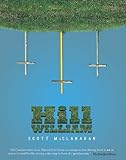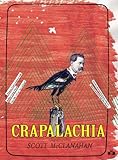The joke is that you know you’re in Real America™ when the IHOPs turn into Waffle Houses. The truth is that you know you’re in Real America™ when everybody’s so dadgum nice that they leave their doors unlocked. Real America™ is where food is fried and guns can be bought on layaway. It’s where opening a bar tab means setting $20 on the counter and drinking ‘til it’s gone.
I’ve been to Real America™; my family lives there.
Growing up, we’d visit them in Perry County — and make no mistake: the county is more important than the state in Real America™ — to drive ATVs around an ancient farm house next to a lake, or a river, or some big body of water rife with bullfrogs. You learn early in Real America™ that the best way to catch one of those suckers is to shine a flashlight in its eyes, paralyzing it, while your youngest cousin snatches its slimy toadskin from behind.
The thing you have to remember about Real America™ is that it’s different from the rest of America. The other thing you have to remember is that for all its charms, Real America™ has secrets, too.
Those houses with their doors unlocked? Their owners keep shotguns to be safe. That farmhouse you’ve visited since you were a kid? Its previous owner hanged himself in the garage. The bullfrog you caught with your cousins? You put it into Tupperware last night, and you knew you were supposed to poke holes in the top for air, but you didn’t because something inside you wanted to see it die.
The food is fried because it’s cooked with love, and love is a synonym for lard, and lard will kill you.
Real America™ is where you get your first kiss, but also your first black eye. It’s where your uncle sets off fireworks each year on the Fourth of July until your family stops inviting him because of something the aunts won’t talk about.
This in mind, I nominate Scott McClanahan as the Poet Laureate of Real America™. He knows all this and more about Real America™ because he was raised in the crucible of a West Virginian holler. For him, Real America™ is less about folk songs, pick-up trucks, and girls in sundresses than it is about pulmonary trauma, Medicaid fraud, and Duke’s mayonnaise. This is not to say that his version of the place is without its chivalry, though: McClanahan’s version of communal giving is a group of trapped coal miners all pledging to conserve oxygen for the youngest laborer, each vowing to die because that guy stands a chance.

 As such, McClanahan is the author of two of the most affecting books I’ve read all year: Crapalachia and Hill William. A mostly-true memoir on the one hand, and a mostly-nonfictional novel on the other, these two works have stuck to my sides for months. I’ve dreamed about them. I’ve chewed on them like the cartilage knuckle on a fried chicken wing.
As such, McClanahan is the author of two of the most affecting books I’ve read all year: Crapalachia and Hill William. A mostly-true memoir on the one hand, and a mostly-nonfictional novel on the other, these two works have stuck to my sides for months. I’ve dreamed about them. I’ve chewed on them like the cartilage knuckle on a fried chicken wing.
Both works inhabit a universe based on the rural towns and mountains where McClanahan grew up. Some facts have been changed, but the gist remains faithful. (When you’re talking about Real America™, after all, emotions are truths and facts are distractions.) Together, the books complement one another in such a way that they present the most unified, singular, and altogether honest account of life in these parts of the country as you’ll ever find. Less concerned with sentimentalizing than with truth-telling, McClanahan peels back the hardened scabs on Appalachian life to reveal the supple, sensitive wounds beneath.
In McClanahan’s own words: “I never look at a painting and ask, ‘Is this painting fictional or non-fictional?’ It’s just a painting.”
Now, to be honest with myself is to admit that there is no way I can convey the effect of these books without giving too much away — a practice I hate in book reviews — and so in lieu of summary or sustained criticism, I’d like to instead present a brief road map for you to interpret on your own, as well as a few selected passages so the books can speak in their own words.
My first direction is that Crapalachia is the funnier of the two. While there’s ample death and mourning in its pages, it feels lighter than Hill William. It contains passages like this one:
“The next night was radio preacher night. That only meant one thing. My Uncle Nathan [who had cerebral palsy] was going to drink beer. He just kept groaning and pointing at the beer and then pointing at his feeding tube. What was the use of drinking beer when you could immediately pour a six-pack in your stomach tube and have it shoot into your bloodstream that much quicker? I poured the beer in and then I poured another. I cracked another and another. Then I did the rest. He smiled and then burped. It smelled like a beer burp.”
My second piece of advice is that Hill William answers a question nobody has ever asked: what would happen if William Blake binge-watched Hoarders and then wrote Deliverance? How’s this for an Appalachian dream vision?
“So I walked to the top of the mountain and I looked up towards the clouds. The sky was streaked with purple and pink. I kept looking and then I saw something. I saw hundreds of dirty angels in the sky. They were flying angels but they had devil horns. They were all swooping down at me and screaming and swirling and telling me in their country voices what I had to do. They were telling me to go see [a] Batman [impersonator at the mall] and everything would be okay. I needed to go see Batman and my world would be healed and made wonderful.”
What I want you to understand about McClanahan’s writing is how, with such spare prose, he’ll fool you into subdued comfort just before gutting you. It’s honest. It’s funny, but it’ll wreck you. Consider these lines from Crapalachia:
“After dinner I took a nap and I dreamed a dream about the future and in this future I was dreaming a dream about the past. But in my dreams I’m always back at Ruby’s house, and back at Ruby’s table. It’s always Sunday again and we’re all just sitting around the table like we always did. Nathan’s on one side and I’m on the other and my grandma’s on the left. And just like always she’s fixed chicken and gravy and we’re all so hungry and passing the plates — the biscuits, the mayonnaise salad, the cucumbers in vinegar, and I think to myself, even now, that this will be what the final moments of oxygen escaping from my brain will be like. It’ll be like a Sunday so long ago with all of the dead stuffing themselves full of food cooked with lard, and gravy that will once again clog their arteries and kill their hearts. It will be the feast of death and it will taste so delicious.”
This writing is remarkable because it’s local but also universal. If you’ve ever been to Real America™, it’ll fill you with nostalgia, and also dread. If you haven’t been, these books will give you a tour. There’s a reason the best ghost stories take place in the woods. Real America™ is haunted, and Scott McClanahan can show you how.
More from A Year in Reading 2013
Don’t miss: A Year in Reading 2012, 2011, 2010, 2009, 2008, 2007, 2006, 2005
The good stuff: The Millions’ Notable articles
The motherlode: The Millions’ Books and Reviews
Like what you see? Learn about 5 insanely easy ways to Support The Millions, and follow The Millions on Twitter, Facebook, Tumblr.









